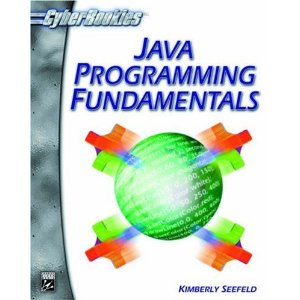Admission
Database developers, Internet application developers, database architects, middleware programmers, database administrators, Java developers, and client/server developers.
Java Programming Fundamentals
| Exam # |
Duration |
Language |
Level |
Type |
Classroom |
Code |
Fees |
|
-- |
42 |
English |
Professional |
Course |
Classroom |
Cs271 |
0 LE |
Description :
The Java Programming Fundamentals course teaches you how to write Java applications and applets. You will learn the Java language mechanics found in other programming languages, such as variables, iterations, control statements, methods and arrays. You will also discuss object-oriented theory as it relates to Java. You will create Graphical User Interfaces (GUIs) for applications and applets, emphasizing components, layouts, and graphics. The course concludes with an in-depth study and implementation of the SDK 1.2 event delegation model, an essential element in further Java studies. You will also complete a course-long project to create an operational client/server messaging system.
Objectives :
-
Describe the Java Runtime Environment (JRE).
-
Use Java variables, control statements, methods and arrays.
-
Discuss object-oriented theory, including abstraction, encapsulation, inheritance and polymorphism.
-
Describe method overloading and overriding.
-
Use Java static and instance members.
-
Create Java constructors.
-
Identify the differences between instance and class members.
-
Use Java abstract classes and interfaces.
-
Use Java Strings and StringBuffers.
-
Describe Java packages and accessibility.
-
Use the Java Abstract Windowing Toolkit (AWT) and Swing components central to SDK 1.2.
-
Use the SDK 1.2.x event delegation model.
-
Define applets and the applet life cycle.
-
Throw exceptions.
-
Create threads.
-
Use streams.
-
Create network applications in Java.
Topics :
Java Runtime Environment
-
The Java Virtual Machine
-
The Java 2 Software Development Kit
-
Java Comments
-
Review Questions
Data Types, Variables and Operators
-
Data Types
-
Declaring Variables
-
Variable Scope
-
Casting
-
Operators
-
Automatic Casting
-
Review Questions
Control Statements
-
Code Blocks
-
Conditional Statements
-
Iteration Statements (Loops)
-
Review Questions
Methods
-
Java Methods
-
Return Statement
-
Calling a Method
-
Parameters
-
Pass by Value
-
Overloading
-
Review Questions
Arrays
-
What Is an Array?
-
Initializing an Array
-
Objects
-
Using an Array
-
Passing an Array to a Method
-
Garbage Collection
-
Command Line Parameters
-
Review Questions
Classes and Objects
-
Object-Oriented Programming
-
What Is a Class?
-
What Is an Object?
-
Instance and Class Members
-
Abstraction
-
Object References
-
Review Questions
Inheritance
-
What Is Inheritance?
-
Overriding Methods
-
Overriding Methods and Variables
-
Review Questions
Constructors
-
What Is a Constructor?
-
Using Constructors
-
The Keyword this
-
Constructor Process
-
Constructors and Callbacks
-
Strings and StringBuffer
-
Review Questions
Interfaces and Abstract Classes
-
What Is an Interface?
-
Polymorphism
-
What Is an Abstract Class?
-
Review Questions
Packages and Access Modifiers
-
Introduction to Packages and Access Modifiers
-
Packages
-
Access Modifiers
-
Java 2 Application Programming Interface
-
Encapsulation
-
Review Questions
Swing Components
-
What Is the AWT?
-
What Is Swing?
-
Swing Containers
-
JavaBeans
-
Review Questions
Layout Managers
-
What Is a Layout Manager?
-
FlowLayout
-
GridLayout
-
BorderLayout
-
BoxLayout
-
Combining Layouts
-
Review Questions
Graphics
-
Graphics Class
-
Color Class
-
Font Class
-
Review Questions
The Delegation Model
-
What Is an Event?
-
JDK 1.0 Event Handling
-
SDK 1.2 Event Handling
-
Review Questions
Inner Classes
-
What Is an Inner Class?
-
Inner Classes for Event Handling
-
Review Questions
Applets
-
Programming Applets
-
Applets and Web Browsers
-
Converting an Application into an Applet
-
Converting an Applet into an Application
-
Review Questions
Exceptions
-
What Is an Exception?
-
Handling Exceptions
-
Creating User-Defined Exceptions
-
Exception Handling Tips
-
Exceptions and Inheritance
-
Review Questions
Creating Threads and Thread Methods
-
What Are Threads?
-
How Operating Systems Handle Multitasking
-
Types of Threads in Java
-
Creating Threads
-
Thread Methods
-
Review Questions
Synchronization
-
What Is Thread Synchronization?
-
Thread Racing
-
Synchronized and the Object Monitor
-
Thread Race Condition
-
Sophisticated Thread Synchronization
-
Stopping, Suspending and Resuming Threads
-
Deadlocks
-
Review Questions
Streams and Serialization
-
What Is a Stream?
-
InputStream, OutputStream, Reader and Writer
-
Files
-
Stream Classes of java.io.*
-
Serialization
-
Graduating Task: Building a simple word processor
-
Review Questions
Networking
-
What Is Networking?
-
Connecting Computers Across the Internet
-
Networking Classes of java.net.*
-
The Java Client/Server Model
-
Building the EchoServer
-
Multithreading Your Client/Server Example
-
Final Project: Building a client/server chat system
-
Review Questions
Recommended Knowledge :
Students must have a basic knowledge of programming fundamentals before taking this course.
Recommended Course(s) :
Object Oriented Analysis & Design
Programming Concepts
Training Materials :
CIW Official Curriculum
Labs :
This course includes several labs to ensure you will gain the targeted skills and experience.
Credential :
This course is a credit towards the CIW Web Developer certification
Category :
Programming
The Instructor:
